Table of Contents
This post is also available in:
![]() Čeština
Čeština
It is absolutely okay to admit that wine is your main motivation for a trip to the country of Georgia. After all, it’s right here in this smallish country in Caucasus, where wine was born thousands of years ago.
That’s right, it wasn’t in Rome or Greece that grapes started to be used for winemaking, all the evidence actually points to Georgia.
Wine is deeply rooted in Georgian life and culture. Take the main statue in Tbilisi overlooking the city, called the Mother of Georgia, as an example:
She is holding a wine bowl in her hands to share with friends or enemies or basically anyone who’s coming for a visit. Even enemies are treated as friends if they come to your house. That’s how it is in Georgia.
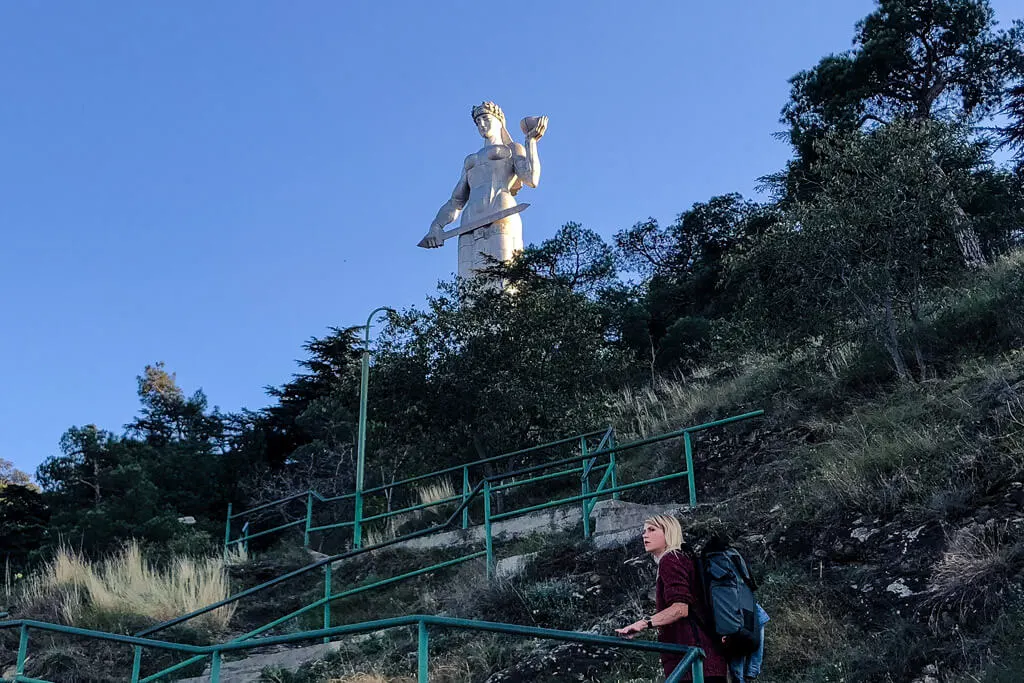
My friend Teru climbing the steps to the Mother of Georgia statue in Tbilisi.
Georgian folk songs and stories passed on through generations all involve wine. The 8,000 years old winemaking tradition in Georgia has become an inseparable part of local life.
It doesn’t matter whether you live in the countryside, where you attend to a qvevri and make your own wine, or if you’re a Tbilisi city dweller climbing the career ladder. Everyone here loves and respects wine.
I was able to explore Georgia’s most notable wineries on a sponsored trip to Georgia and Azerbaijan with JayWay Travel, a boutique travel agency, which I’ve happily cooperated with for over 2 years.
Btw. please note I’ll only be referring to the “Republic of Georgia” wine, not the American State. We’re staying in dear old Caucasus for this wine exploration.
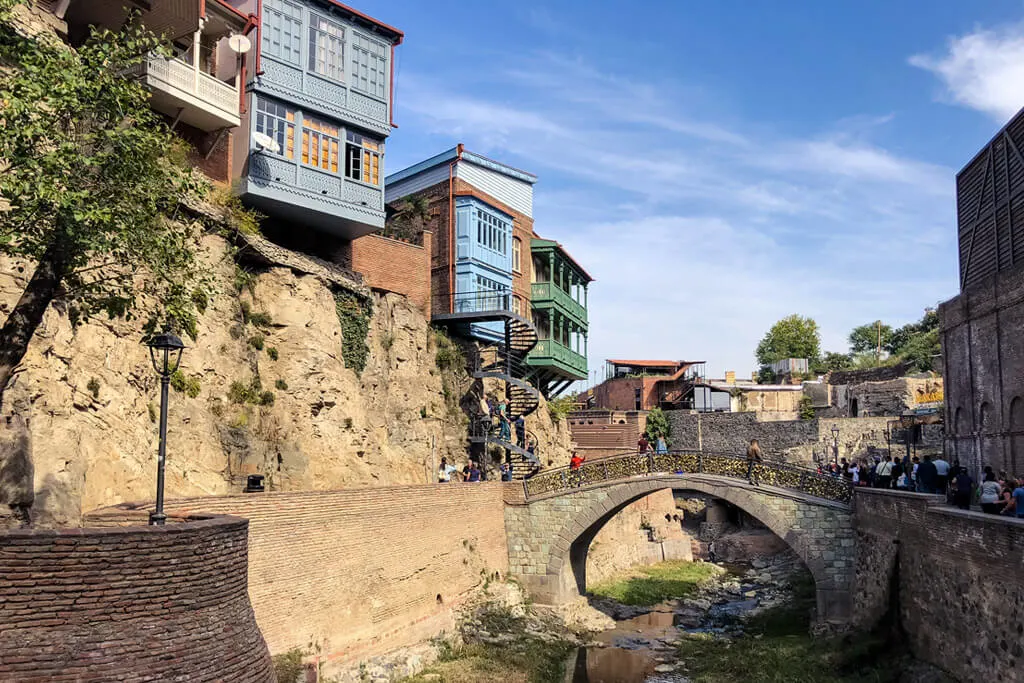
On the edge of Old Tbilisi
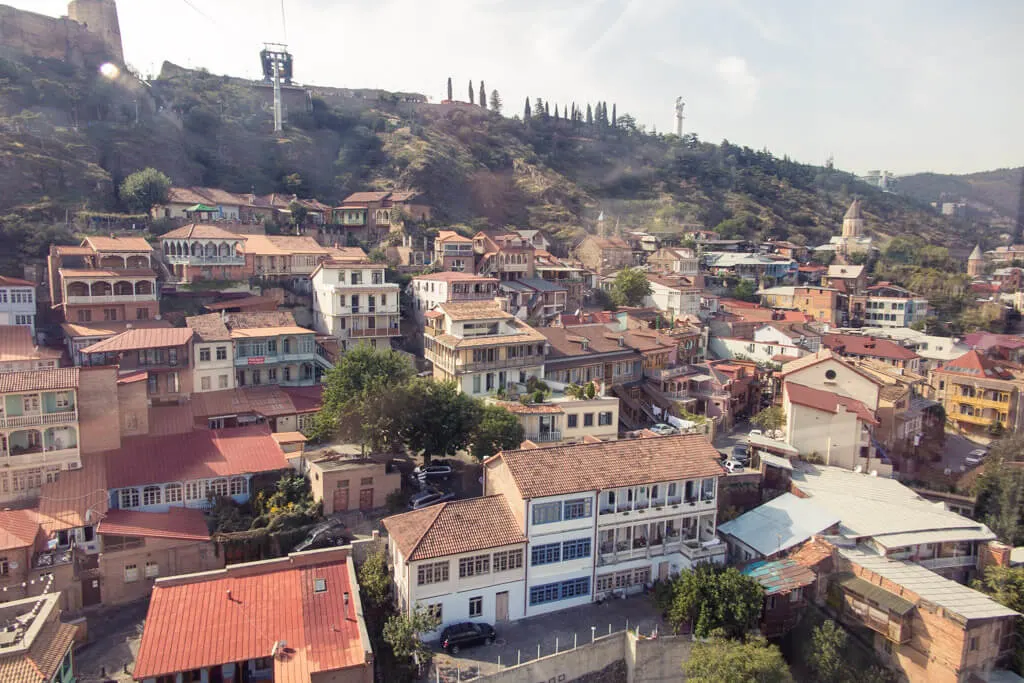
Sunny Tbilisi from a cable car
Georgian way of making wine
To understand the unique technique of winemaking in Georgia and its fascinating Georgian wine history, you need to familiarize yourself with the Qvevri found in nearly all Georgian cellars.
So what is exactly Qvevri?
Qvevri, often also spelled kvevri, is a large clay pot in which the wine matures. This is how it’s used in the winemaking process:
The grapes are crushed and are placed in the qvevri, which is then buried in the ground. The winemaker stirs the mixture every day for a few days and then seals it for months to allow for the fermentation to happen. The wine takes about 5 – 6 months to mature.
Actual wine was discovered when the Georgians would store their grape juice in the clay pot over winter and notice that the grape juice would turn into something amazing – wine!
The traditional Georgian way of making wine using a Qvevri is so unique that it was inscribed on the Unesco Representative List of the Intangible Cultural Heritage of Humanity in 2013.
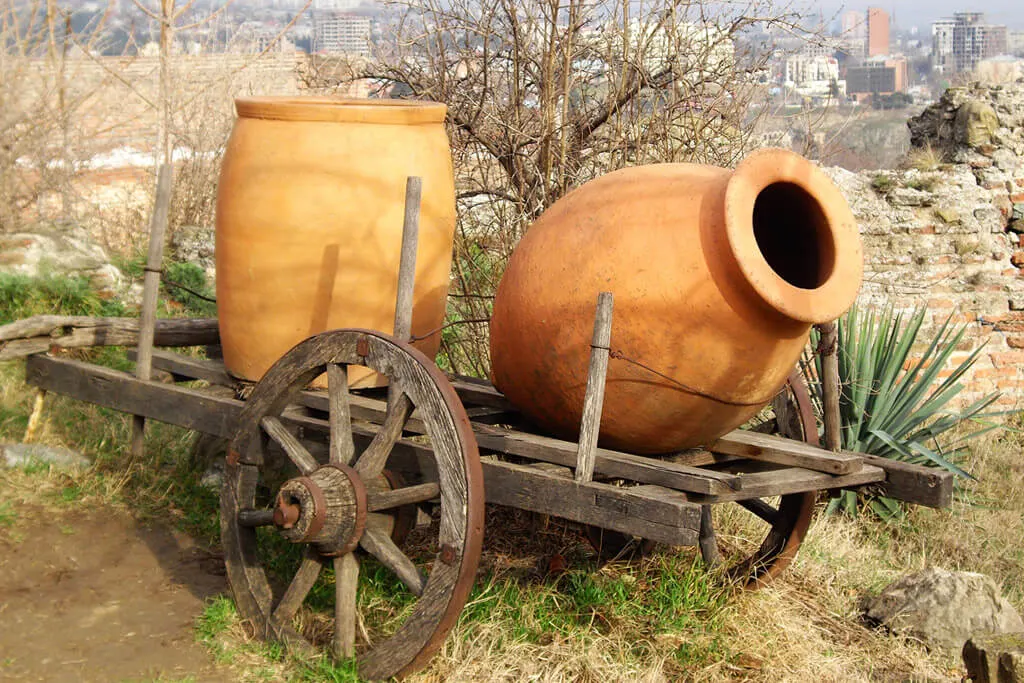
This is how a Qvevri looks :)
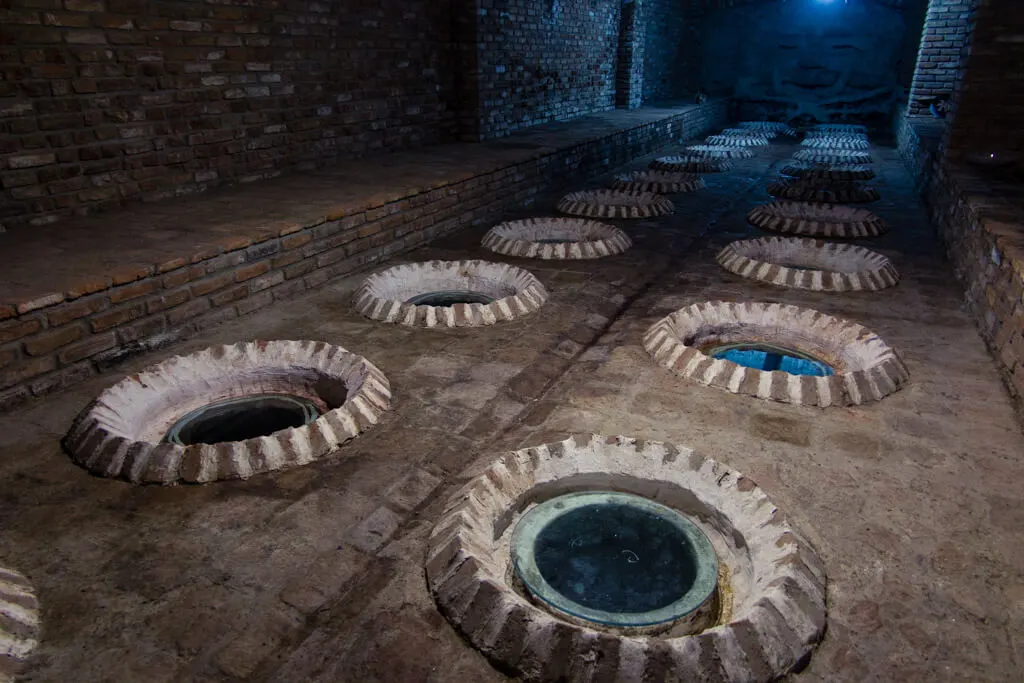
Qvevri in the ground at Shumi Winery
Chacha
A noteworthy byproduct is created during the process of winemaking. After the wine is taken out of the qvevri, the ‘leftovers’ (called pomace or marc) go through a process of double distillation.
What emerges is called chacha – a wonderful grape brandy. It’s a lot stronger than the wine, it’s crystal clear and can leave your head spinning.
While the chacha from a store contains usually 45% alcohol, the home brewed version can get as high as 65%!
Chacha resonated with me because it reminded me of the plum brandy that’s typical in the region where I come from in the Czech Republic. Similarly, chacha is claimed to have some medicinal properties such as treating an upset stomach. Use at your own risk. :)
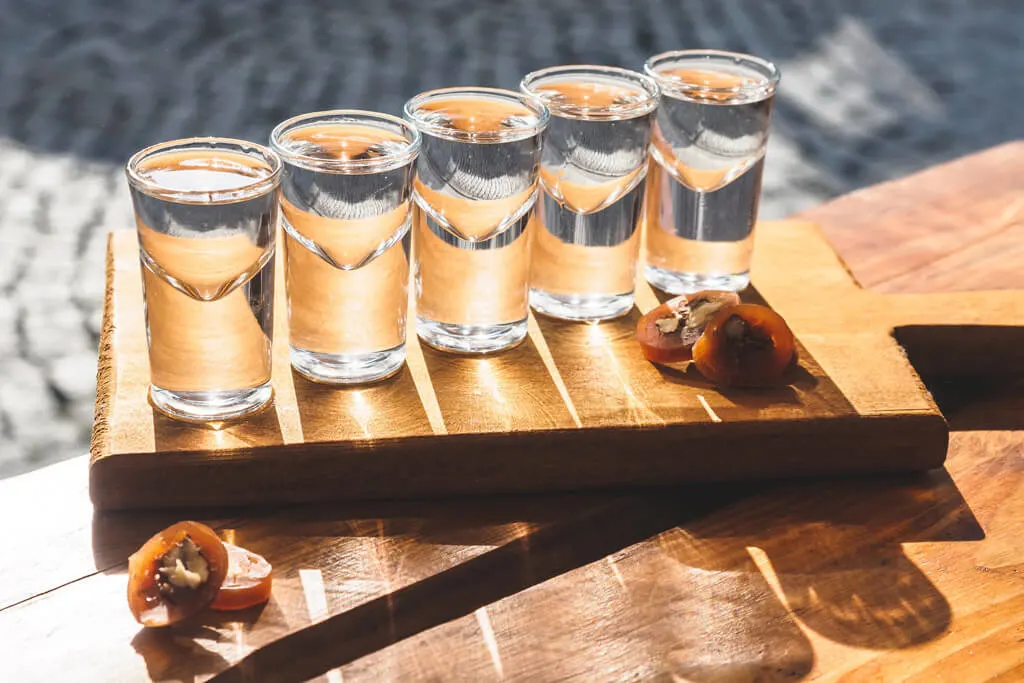
Chacha.. it looks like water but it’s not ;)
Georgian wine to try
While I’m no expert when it comes to wine, based on the knowledge of our guide George, a few local winemakers, and a bit of a further research, these are the most typical Georgian wines you should try when visiting Georgia:
Georgian red wine
Saperavi
Georgian wine Saperavi is one of the first red wines you should try in Georgia. It’s a dry red wine and it can be made in a qvevri. Saperavi is made in the Kakheti region not far from Tbilisi and nearly every wine place in Tbilisi stocks it.
Khvanchkara
The Georgian wine Khvanchkara is a semi-sweet red wine made in the western part of Georgia. It has a dark ruby color and is perhaps the most popular Georgian semi sweet red wine.
Kindzmarauli
Georgian wine Kindzmarauli is also made from the Saperavi grapes. This wine is dark red and naturally semi sweet. It has won numerous awards and is thus one of the best-known wines from Georgia.
Mukuzani
Mukuzani is a Georgian red wine made in the village of Mukuzani, also from Saperavi grapes. This one too has been internationally acclaimed and is considered to be the best dry red wine of the Saperavi variety.
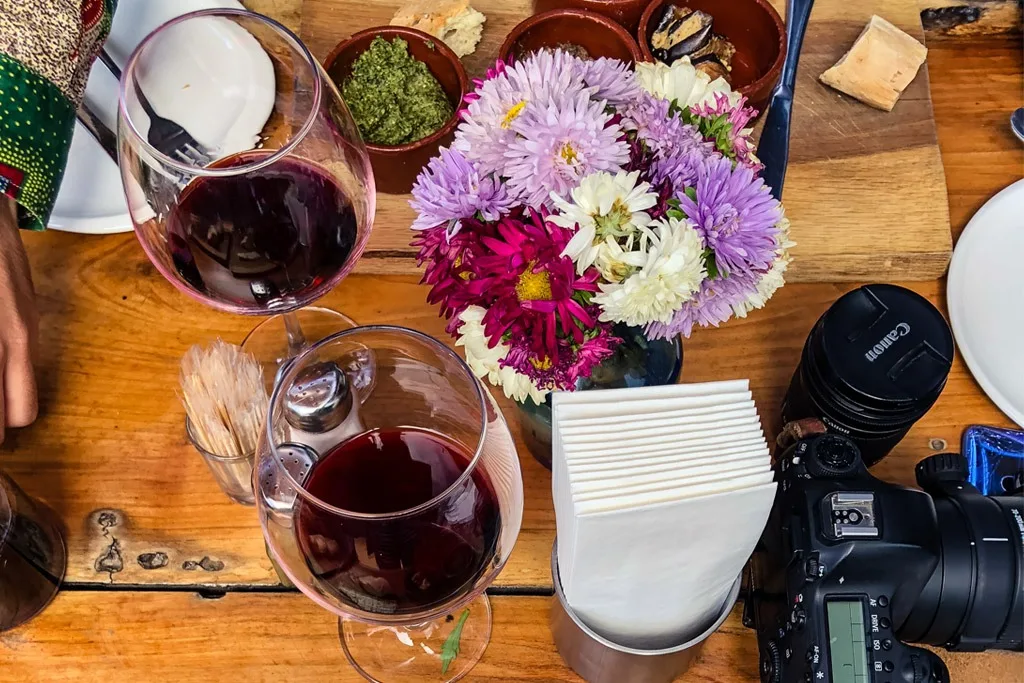
Always on the table when sitting down for a meal: wine and cameras :)
Georgian white wine
Tsinandali
Dry white wine from Kakheti region, Tsinandali village.
Tvishi
Naturally semi-sweet white wine, which has won many international awards.
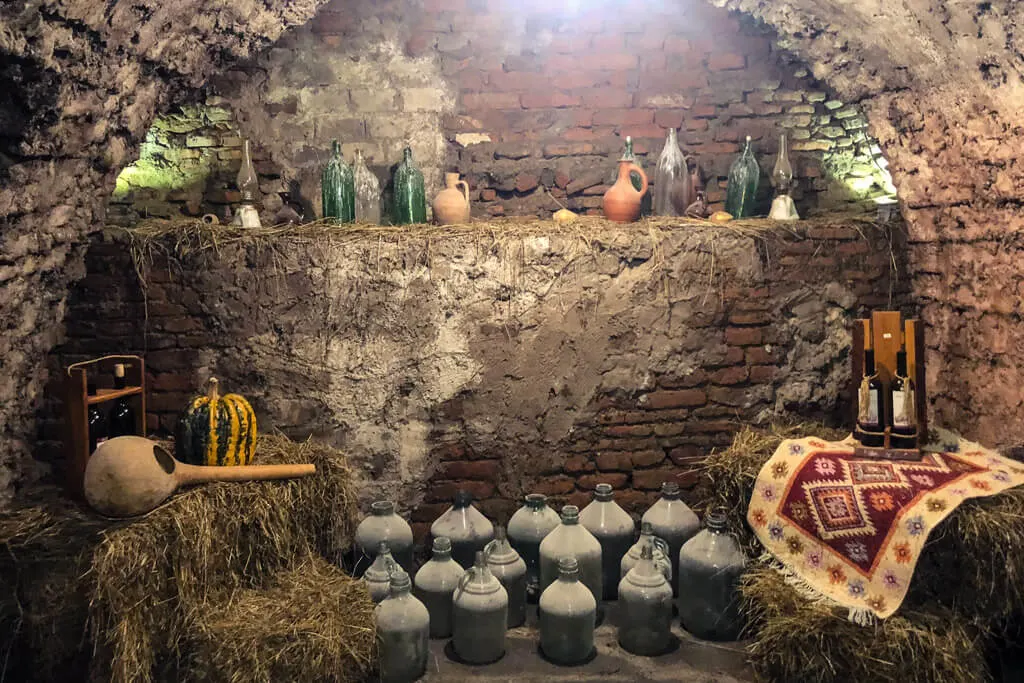
A traditional wine cellar in Tbilisi (only kvevri is missing)
There are many more wine options you can explore in Georgia. I found Wikipedia’s overview of the individual Georgia wines to be the best. See the full article here.
Most of the wines in Georgia are blends of different grape varieties. Not every type of wine is made using the old qvevri method – you can find that info on the wine label.
In Georgia more than anywhere else, don’t be afraid to listen to locals’ suggestions about which wine you should taste. Everyone is a wine connoisseur in Georgia, the cradle of wine. :)
If you want to drink Georgian wine in the old school Georgian way, you need to ask for it to be served in a goat horn. Every winery has them, however nowadays the Georgian wine horn is most often used for decorative purposes. :)
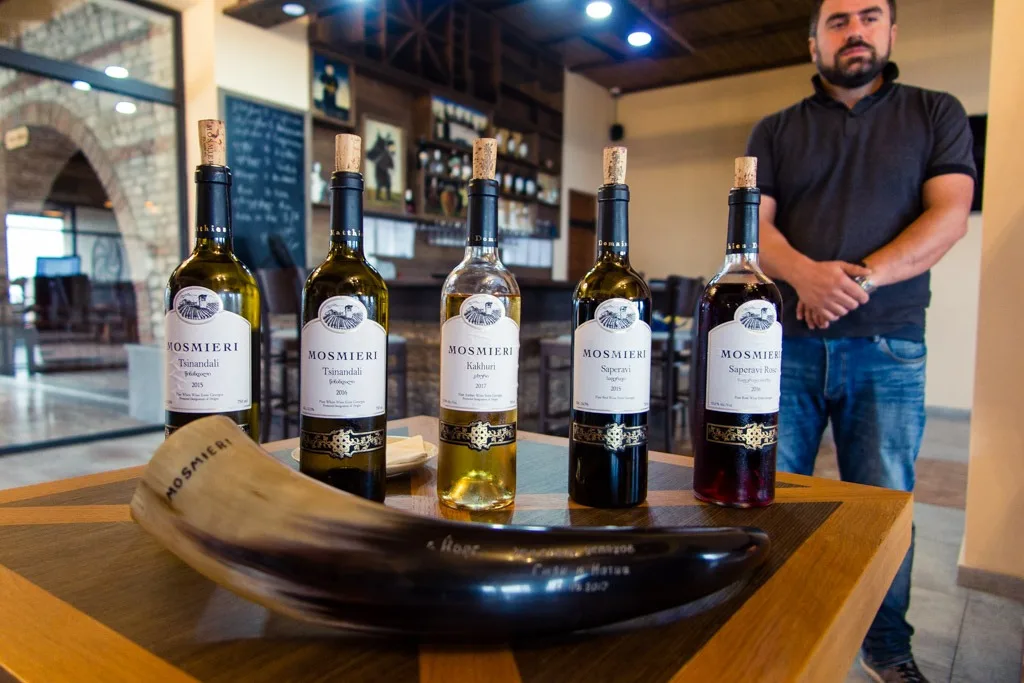
Ready for some wine tasting at Mosmieri! The goat horn is just for decoration :)
Wine Shops in Tbilisi (with free degustation)
You can count on there being authentic Georgian wine in these shops and, since tasting is encouraged, you’ll know exactly what you’re getting. We visited both of the shops below and enjoyed the wine tastings a lot. :)
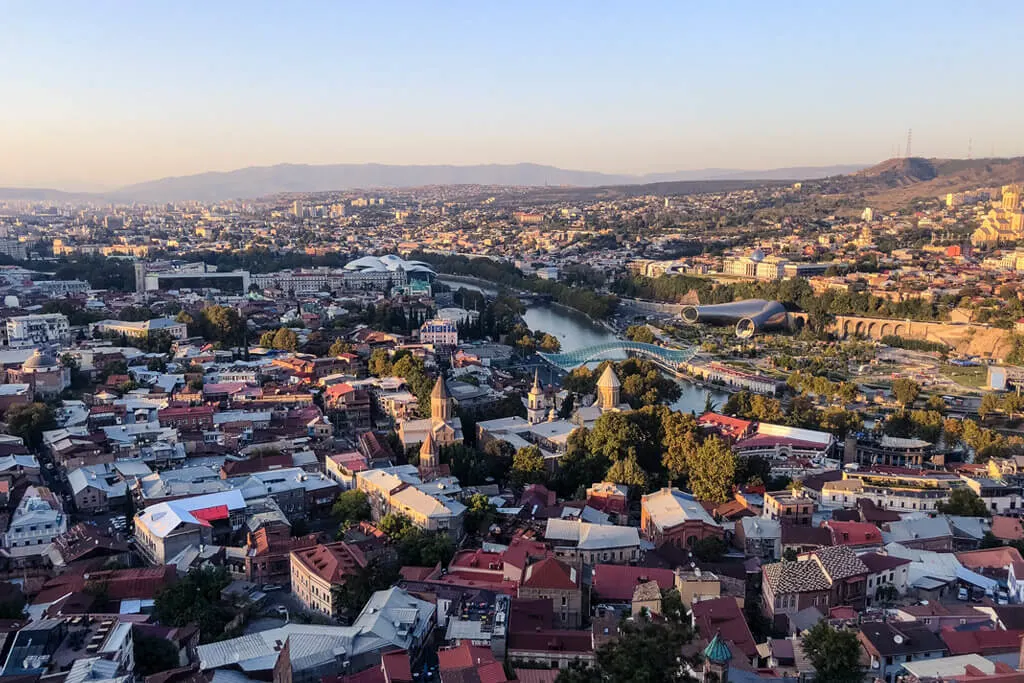
View of Tbilisi during the Golden Hour <3
Old Cellar Tbilisi
K. Afkhazi 51
While the ground floor houses the shop and (free) wine tasting area, you can also go peak inside their 17th century cellar, where old wine bottles are stored and qvevris are displayed.
This Tbilisi wine shop stocks wine bottles from small producers spanning all regions of Georgia. As we learned during our little tour, there are 527 native varieties of Georgia grapes, of which 50 are used for winemaking.
We had our favorite Saperavi wine (both non-qvevri and qvevri-made), a red Khvanchkara wine, and a dry white wine called Mtsvane.
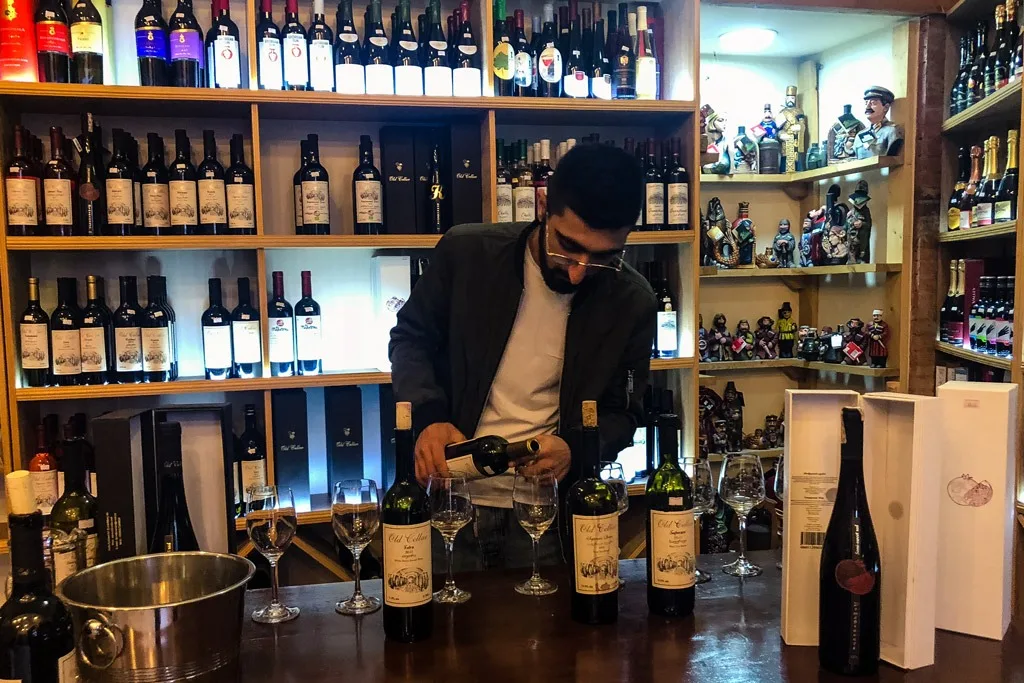
Wine degustation in Old Cellar
Wine Gallery Tbilisi
39 Tsinamdzgvrishvili Street
At the first sight this wine shop looks like a luxury store even Manhattan would be proud of. Bottles of wine are stacked high and a massive crystal chandelier effortlessly complements the lavish interior.
No need to feel intimidated, though. The friendly staff can help with your selection and find a perfect bottle for you at any price range.
The underground section is dedicated to wine tasting and you can try any wine you like, even a chacha, which we happily did. ;)
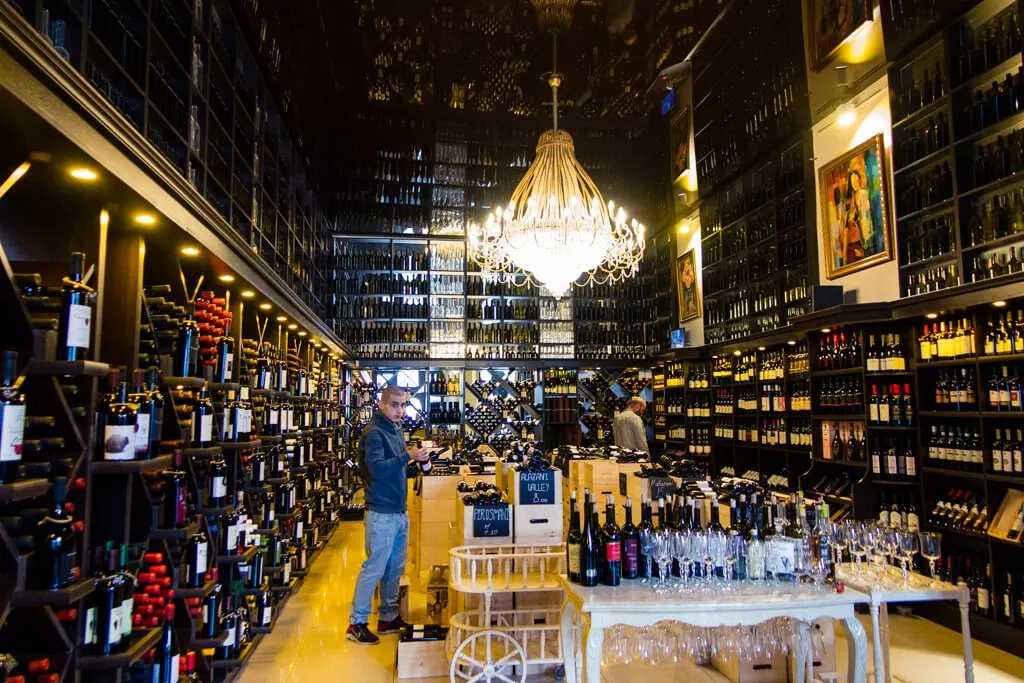
Inside Wine Gallery Shop
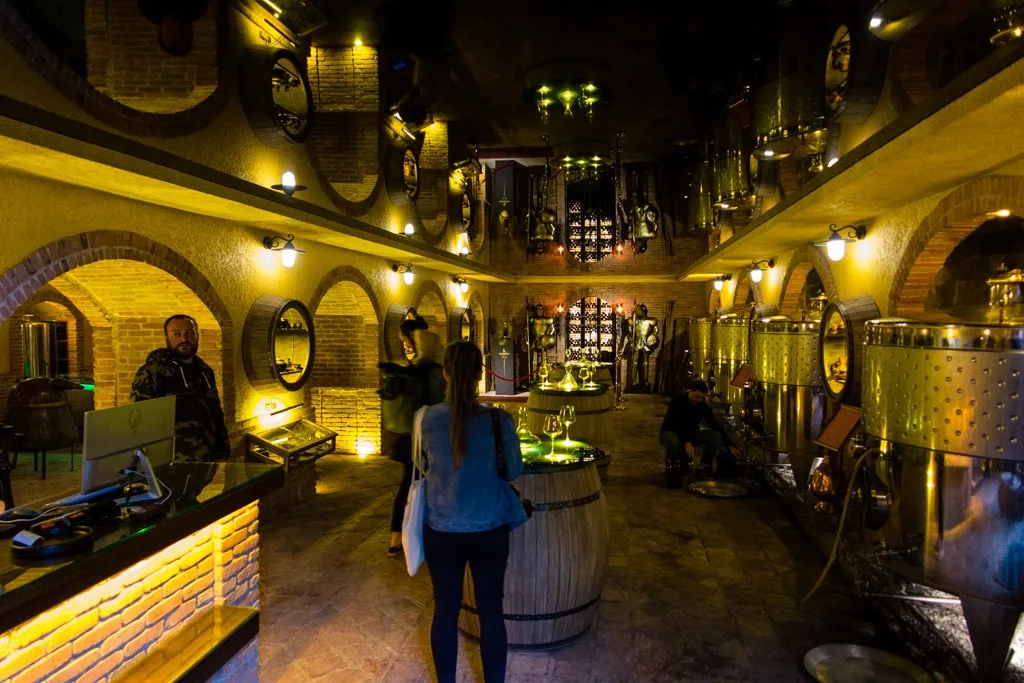
Wine Gallery’s Underground – a cellar and a degustation space in one.
Tbilisi Wine Bars
Even though we had limited time in Tbilisi, we still managed to check out a few wine bars. Each of the following two that we came across was quite the unique little gem.
Vino Underground Tbilisi
15 Galaktion Tabidze Street
Wine Underground Tbilisi was apparently the local pioneer of natural wines. Its cozy underground interior with arched ceiling features a large front room and a small back room where you can relax on seating made from palettes after a long day of walking around Tbilisi.
We enjoyed a full bottle of Georgian wine Saperavi and a few glasses of wine with unpronounceable names, such as a dry red wine called ‘Tsitska-Otskhanuri Sapere’.
You can try different wines by the glass, and the friendly waiters will be happy to advise if you feel unsure about your wine choice.
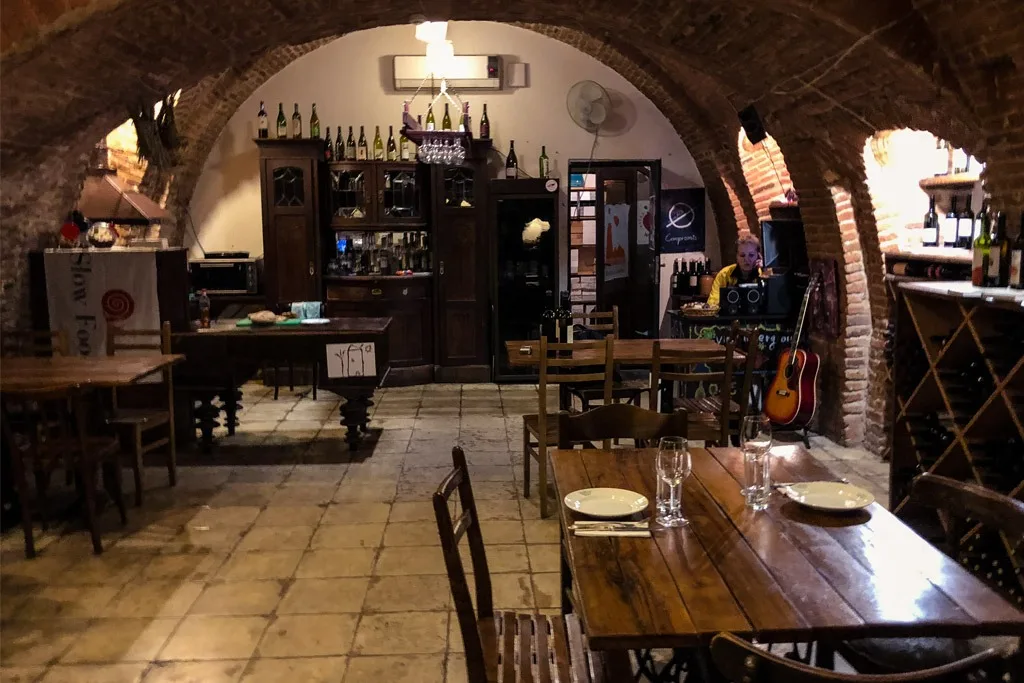
Vino Underground – you can sit in this nice open front room or venture further back and sit on palettes.
Royal Wine Tbilisi
23 Titsian Tabidze Street
Again, we chose to sit all the way in the back. The helpful lady (who I suspect was Nino, the owner) shared her knowledge about her wines as she was serving us.
At one point, she came across us all gathered around a strange looking tool, wondering what it could be used for. She showed us it was a ladle for taking out the wine out of qvevri! :)
The wine selection is wide and ranges from small producers to large wine companies. I feel lost when presented with such a variety, so it’s good you can rely on the advice of the helpful staff.
The chairs in the back room, made out of small barrels, are not the most comfortable in the world, but they sure look cool.
Another thing that’s special about this bar & shop is the working wifi. :)
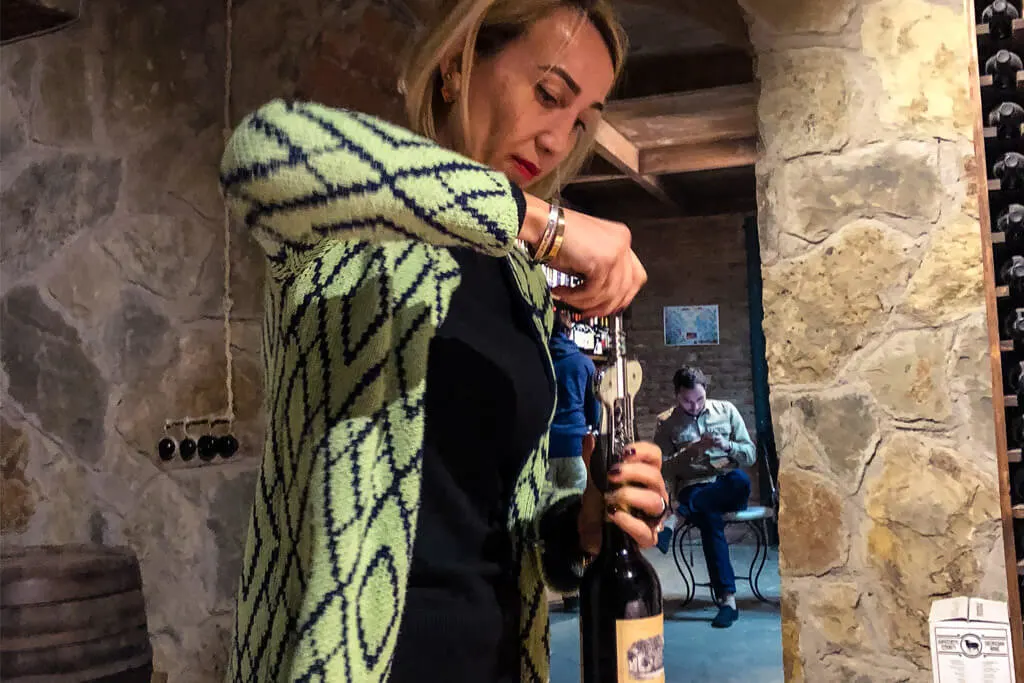
Nino is opening a bottle for us at her bar Royal Wine
There are of course plenty more good wine bars in Tbilisi. We only visited these two due to our limited time, but even local restaurants are stocked well when it comes to wine (and chacha). It’s a lot harder to avoid wine in Tbilisi than to have plenty of it.
Best Wineries and Vineyards Outside Tbilisi
You can either visit the following wineries and vineyards when travelling from one side of Georgia to the other, or do a day trip from Tbilisi. Because all the best day trips from Tbilisi involve wine.
Kakheti is the premiere Georgian wine making region, with nearly 70% of the wine produced in the country coming from Kakheti Georgia. The largest concentration of the best wineries in Georgia can be found in the Kakheti region too. The same goes for vineyards in Georgia.
Kakheti shouldn’t be missing on your list of places to visit in Georgia!
Mosmieri Winery
Driving time from Tbilisi: 2h
‘Mosmieri’ in the Georgian language refers to someone who loves wine. I instantly felt welcomed at the winery. Spacious, modern and beautiful, this winery was started in 2015 and serves as a prime example of how Georgian traditional art of winemaking can be brought into the 21st century.
The modern and beautiful feel quickly made Mosmieri the best Georgia winery for me.
Apparently, there’s also a beautiful mountain view from the estate, but it unfortunately stayed hidden to us thanks to a heavily overcast sky.
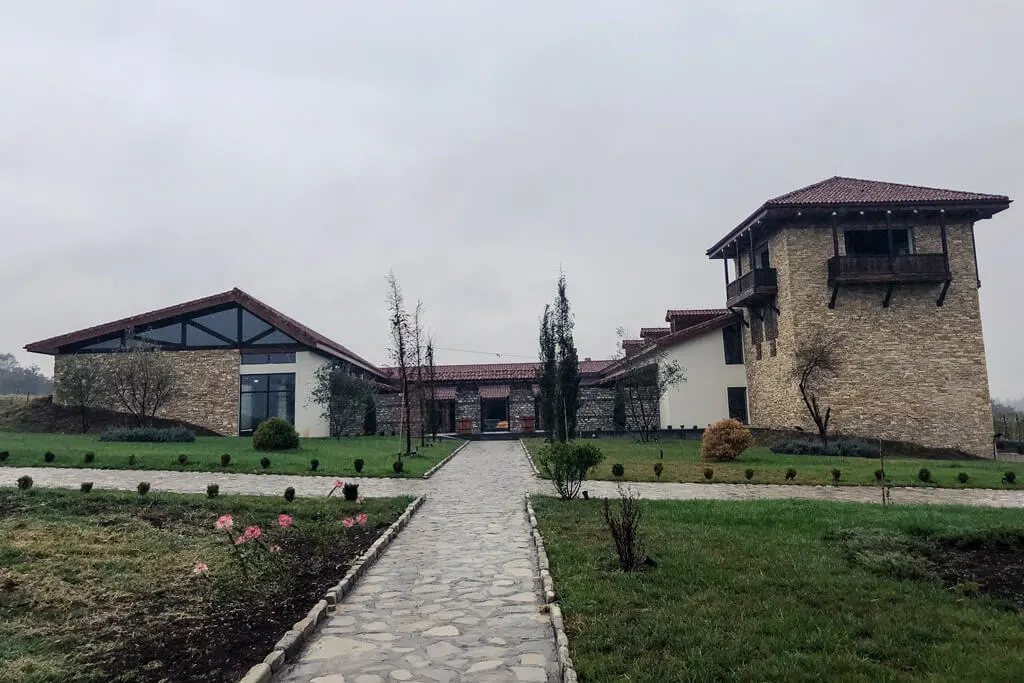
Mosmieri Winery on a cloudy day
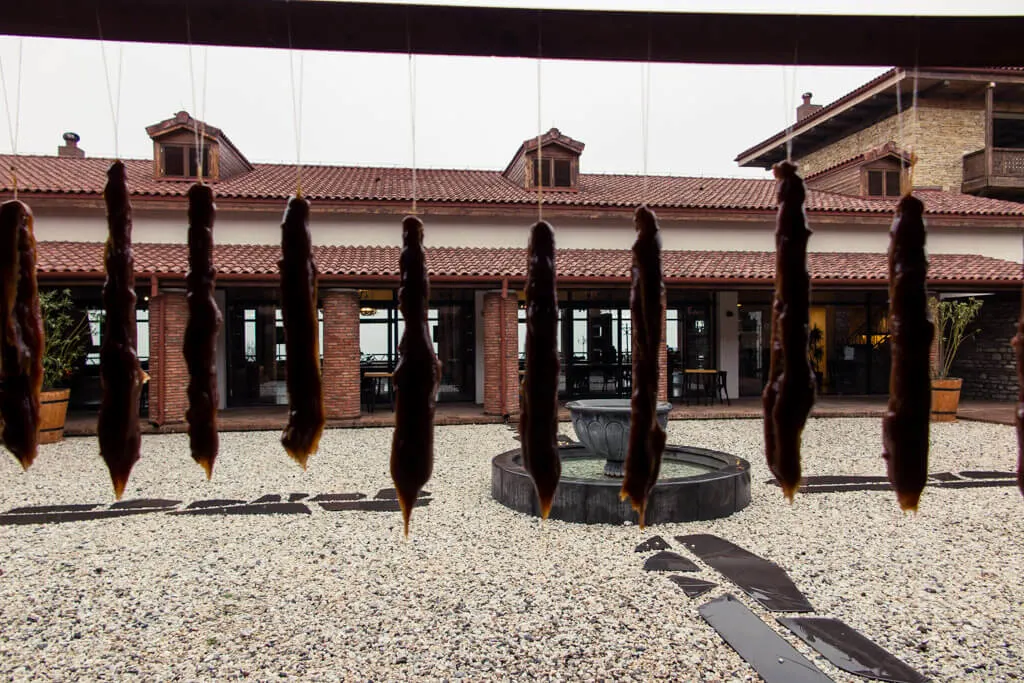
Churchkhela hardening at Mosmieri Wine Estate
Mosmieri Winery has their vineyard in Tsinandali village in the Kakheti region of Georgia. Apart from trying the white wine named Tsinandali, we also drank a Saperavi, as well as a unique rosé Saperavi, which was wonderfully fruity.
We also tasted a fine amber wine called Kakhuri, which is always made in qvevri wherein the wine stays in contact with the grape skins for a longer period of time. It’s also called the Georgian orange wine.
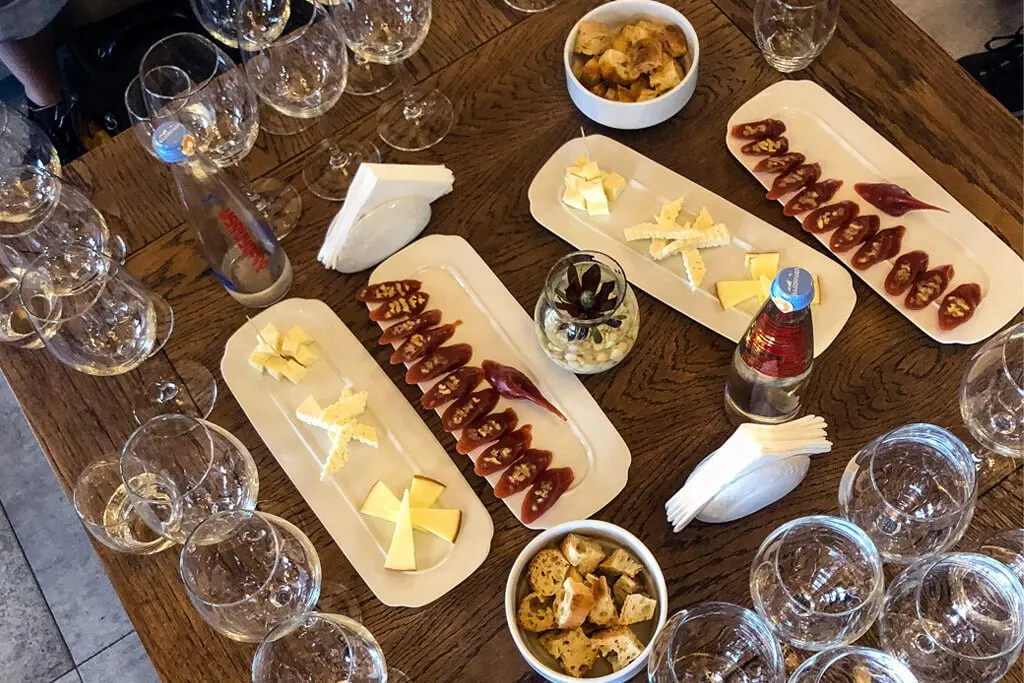
Ready for an extensive wine degustation, accompanied by cheese and churchkhela
We visited Mosmieri Winery in October, when it was about 12 degrees Celsius and drizzling. You know the type of cold humid weather that despite being not too cold temperature-wise, quickly gets to your bones? Well, the Mosmieri Winery was a perfect fix for that.
When you’re done walking around, checking out the qvevri and the hardening churchkhela, you simply must venture inside the estate. When needed, they fire up the fireplaces and keep it on a nicely warm temperature inside. We were so happy to stay longer than what we had originally planed.
Our wine tasting in Mosmieri turned into a full on meal for us, because once we tried their oyster mushroom starter, we had to order a lot more. Yum!
Our guide George from Georgia :) took the opportunity to describe the Georgian tradition of toasts to us. Every dinner event, called supra, would be accompanied by rows of toasts. The main person, the toastmaster a.k.a. tamada, keeps bringing up toasts on any topic possible.
We tried imitating the toastmaster, but ended up only drinking to being grateful for having an amazing trip in Georgia with such awesome people around.
In Mosmieri we experienced the best wine tasting in Georgia. It was a perfect combination of the amazing Georgian wine, ambiance, people and food.
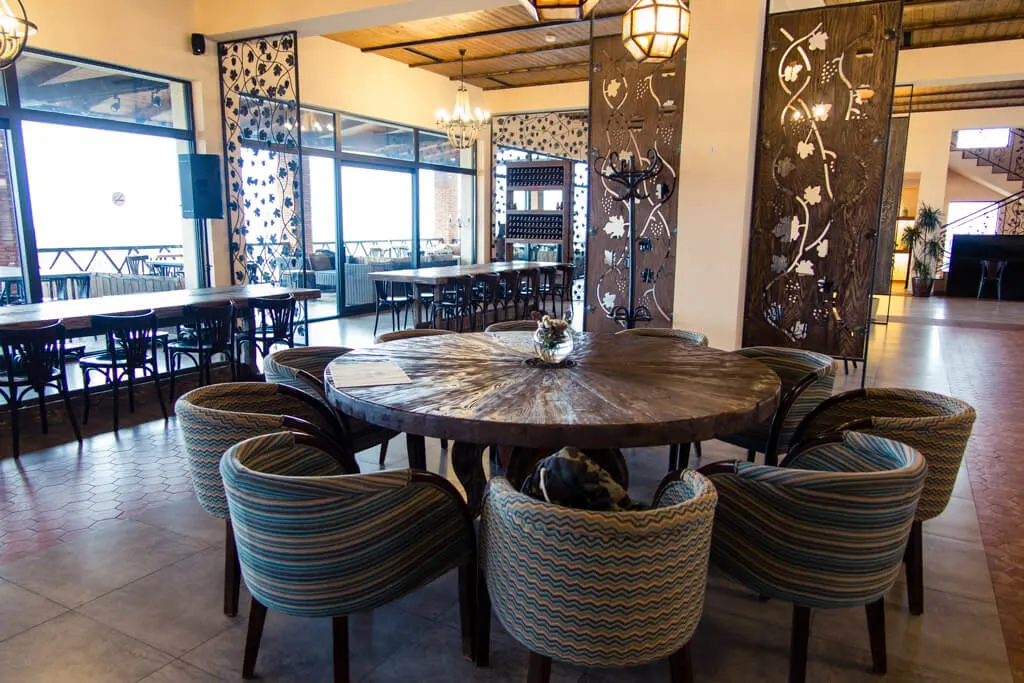
Beautiful interior of Mosmieri Winery
Shumi Winery
Driving time from Tbilisi: 2h
We proceeded to Shumi Winery after spending a few hours at Mosmieri. You can imagine we were already in a ‘heightened mood’, if I may put it so subtly. :D
We even stopped caring about the weather for a moment and happily ran around the vineyards of Shumi. They are located in Tsinandali, right by the winery, and so you are welcome to stroll around and admire the different varieties. They make wine here out of 400 different types of grapes, of which 300 are purely Georgian.
Shumi wine estate felt like a bit of an entertainment center to me. There was a lot going on. The moment you enter, you might notice a piece of meat being roasted in a clever way. How so? A small water stream powers a series of watermills, which turn the meat.
Just a few minutes after entering, a certain somebody screamed ‘Puppies!’ and proceeded to scoop one up with her hands. The little puppies made everyone’s day and Shumi immediately became our favorite winery. Even a few die-hard wine fans in our group opted out of more than a few sips of wine in exchange for more puppy cuddling.
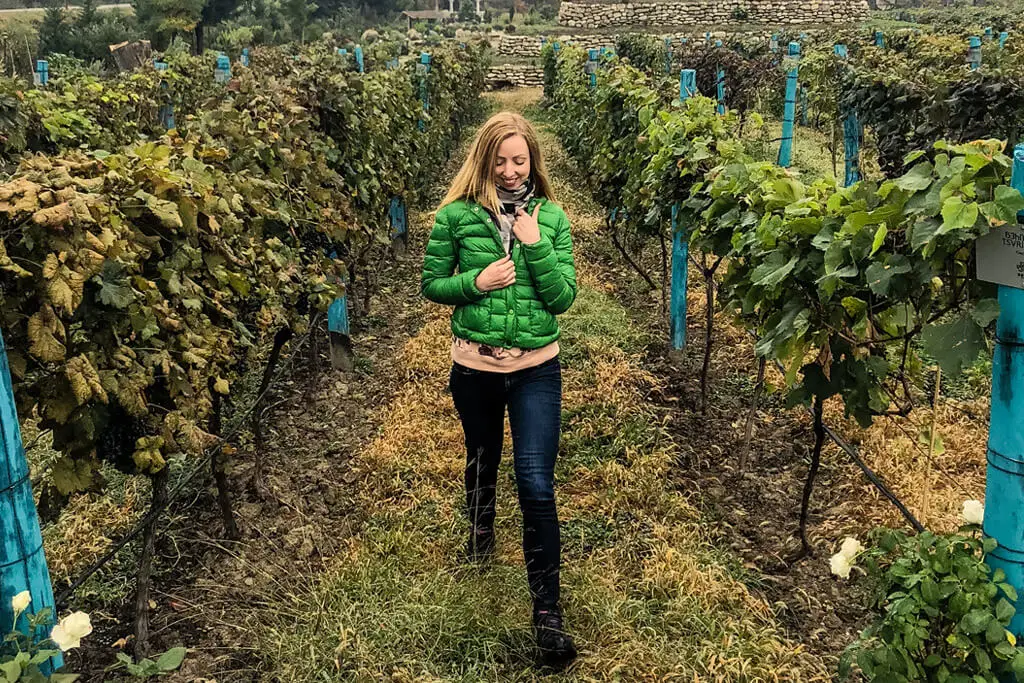
Strolling the vineyards of Shumi Winery accompanied by a good mood :)
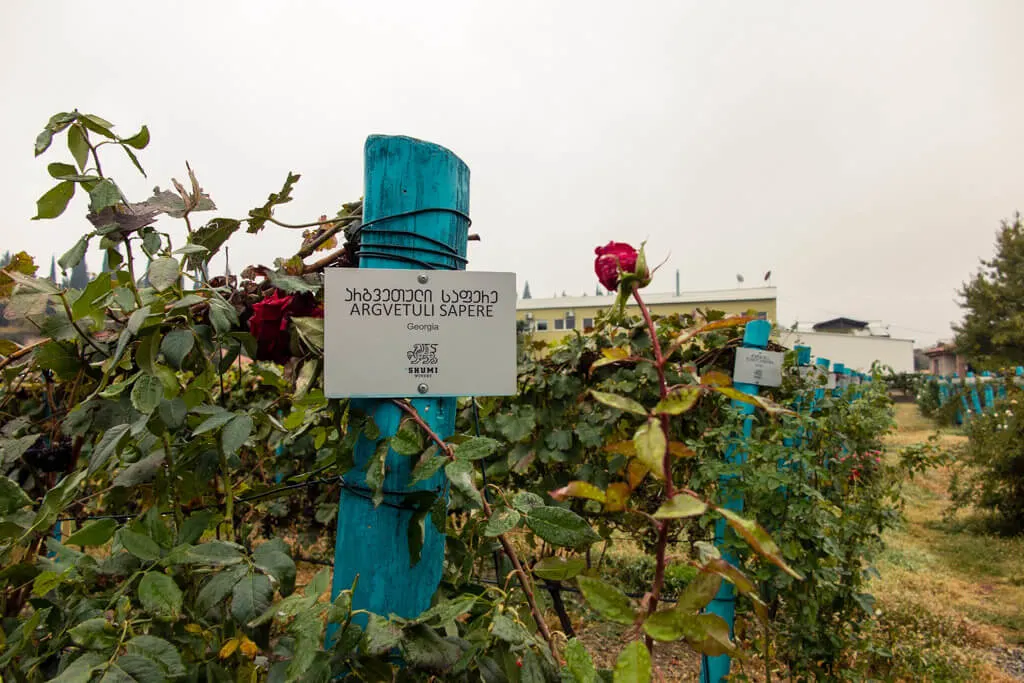
Shumi Vineard in Kakheti Georgia
But there was more going on. Local teenagers visiting on a school trip were trying to make their own churchkhela, a typical Georgian dessert. They would dip a string of walnuts into a thickened grape juice and let it harden.
A lady from the estate was showing how to make local bread baked in a special stone oven. Who knew that Georgians made bread in a similar way as the Indian naan by sticking balls of dough to the inside walls of a clay oven? I certainly didn’t.
After a tour of the premises, with a focus on the wine cellar and the little museum of wine, we proceeded to the wine tasting. Here at Shumi everything is done outside, but fear not, if it gets cold, they have plenty of blankets to wrap you up in.
The wine was excellent, no wonder the name of the winery translates into ‘high quality wine’. A few pieces of cheese to accompany the wine and we were off. There’s no proper restaurant on the estate, so don’t come here hungry. Or just tame the hunger with wine .:)
Shumi winery was established in 2001. It felt less polished than e.g. Mosmieri, but the more authentic.
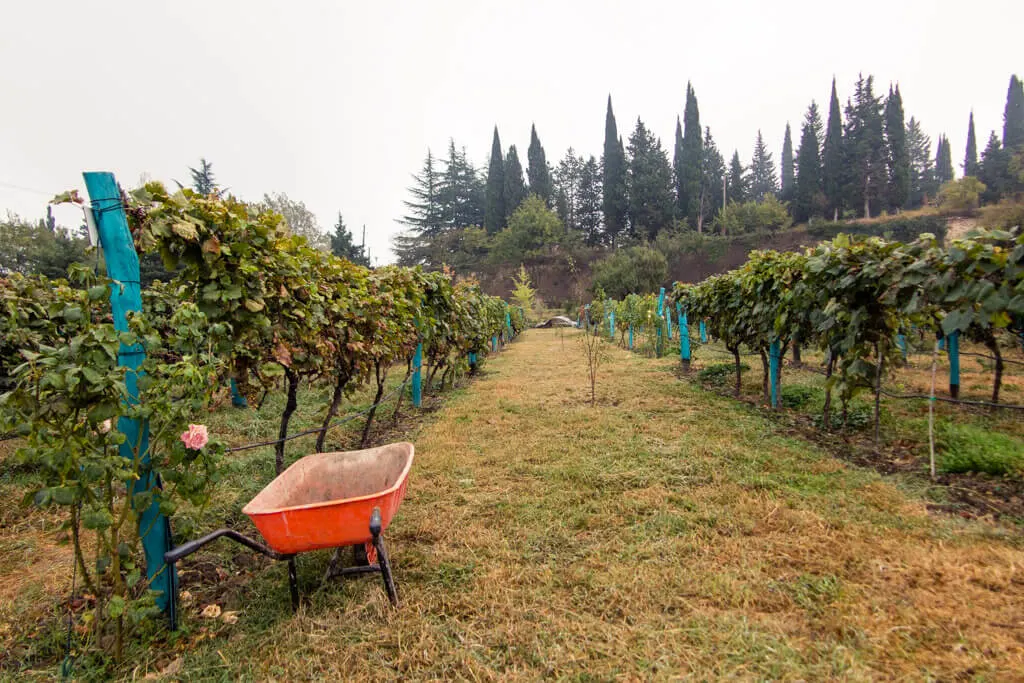
Keeping it real in the vineyards of Shumi
Chavchavadze Estate
Driving time from Tbilisi: 2h
Wine tasting in the cellar of a museum? Wine not? :)
The Chavchavdze Estate is located in the village of Tsinandali in Kakheti. In the early 19th century it used to serve as a summer palace for the late Prince and a poet Alexander Chavchavadze, the founder of Georgian romanticism.
Chavchavadze used the palace he built to entertain foreign guests. For that purpose, he also built an extensive winery.
Since Chavchavadze was familiar with European wines, thanks to his studies in Europe, he managed to beautifully marry the European and ancient Georgian way of winemaking. That’s how most wine estates operate nowadays – they all combine the traditional Georgian and the European way of making wine. The Tsinandali wine can be considered one of Chavchavadze’s legacies.
The décor of the museum itself is largely European. Since photographing is not allowed inside, I can’t show you how pretty some of the rooms were. You also cannot wander around the house without a guide.
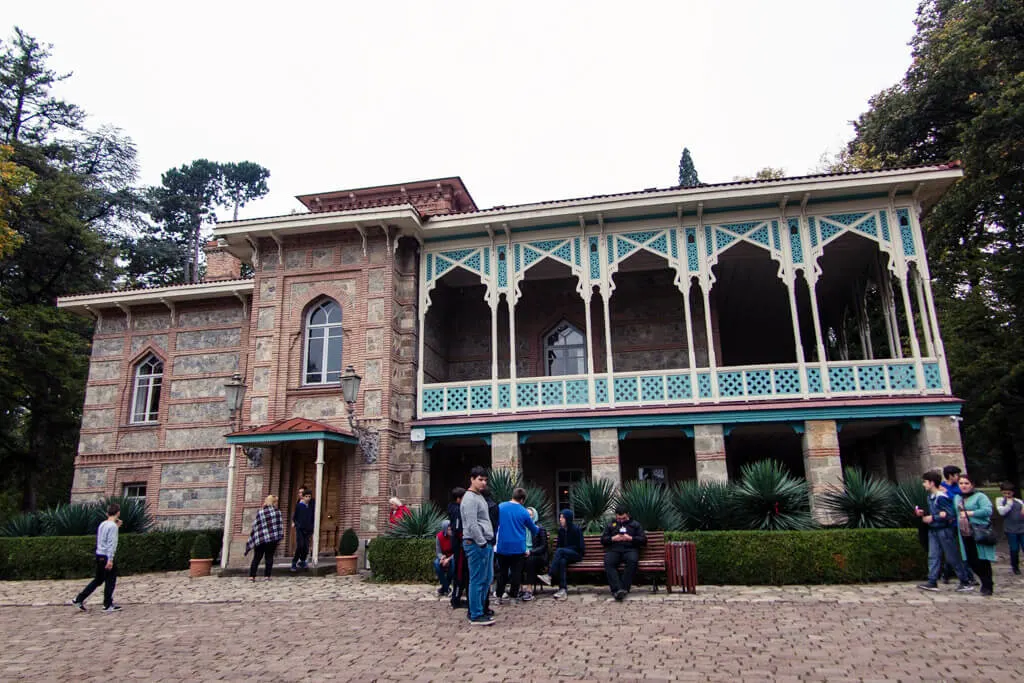
Chavchavadze Estate in Tsinandali
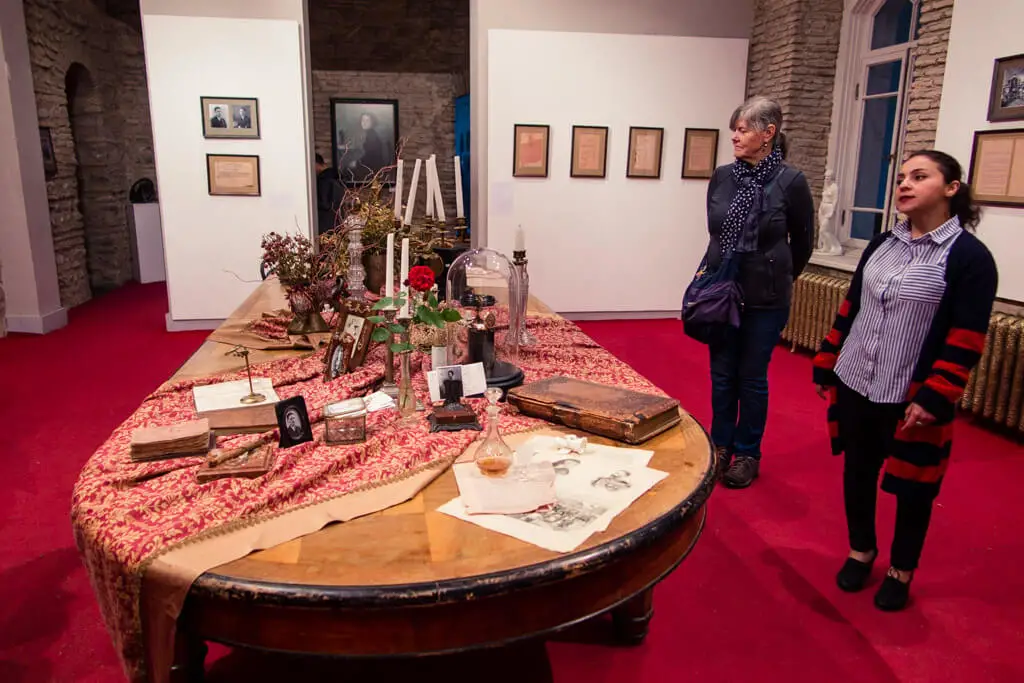
The only room you can take photos of at the Chavchavadze Estate
The wine cellar felt a bit crowded, as we were not the only tourists there. We could barely find a few free seats at the bar.
The man who served us was behind a counter and had a lot more people to serve. Perhaps that’s also why he wasn’t as warm towards us as everyone else we had encountered in Tbilisi.
The wine was delicious, though. Make sure to try the local special variety: Tsinandali wine.
Other than the living quarters and the wine cellar, the place features a hotel and a café. I enjoyed hanging out in the café, the atmosphere was relaxed and it was the best place to wait at for our guided tour to start.
There’s a large garden behind the estate that’s worth seeing too. Except when the weather turns nasty, like it did when we visited in October.
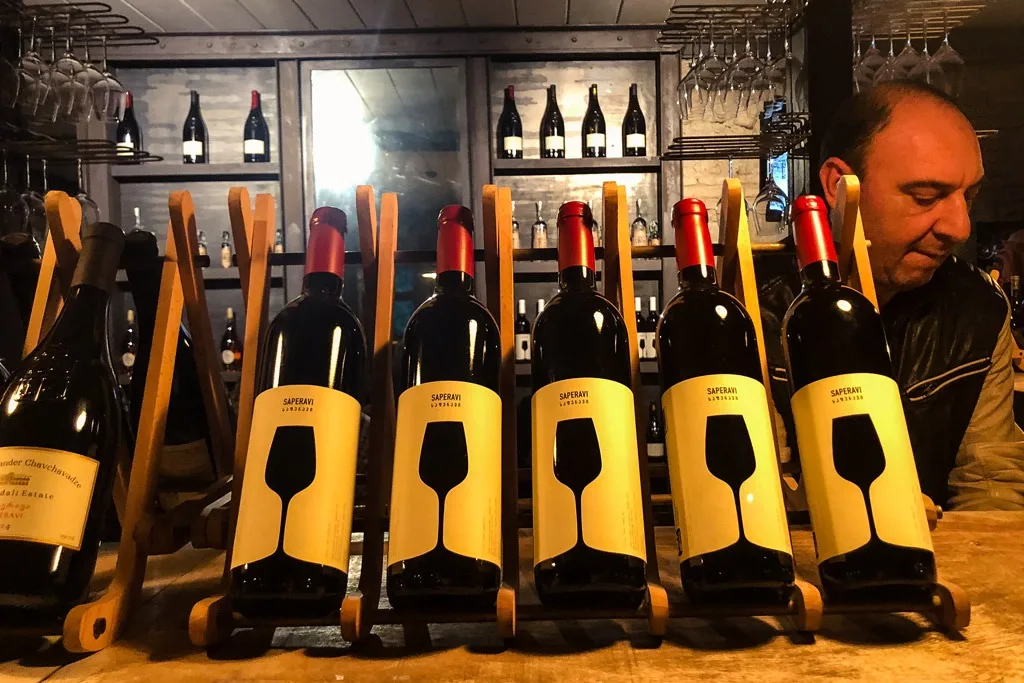
Wine degustation in the cellar of Chavchavadze Estate (Museum)
Khareba Winery
Driving time from Tbilisi: 2h 20min
Our first impression of Khareba was rather grand – there was a local traditional band singing and performing by the entrance!
Otherwise the entrance was rather cave-like and reminded me of the Cricova wine “city” in Moldova, about which I’ll write some other time. :)
Khareba winery is truly unique thanks to 15 tunnels, which have been carved inside the granite rock, keeping a nice stable temperature that benefits the wine. The tunnels are nearly 8km long and about 26,000 bottles of wine are stored there nowadays, some of which are as old as 14 years!
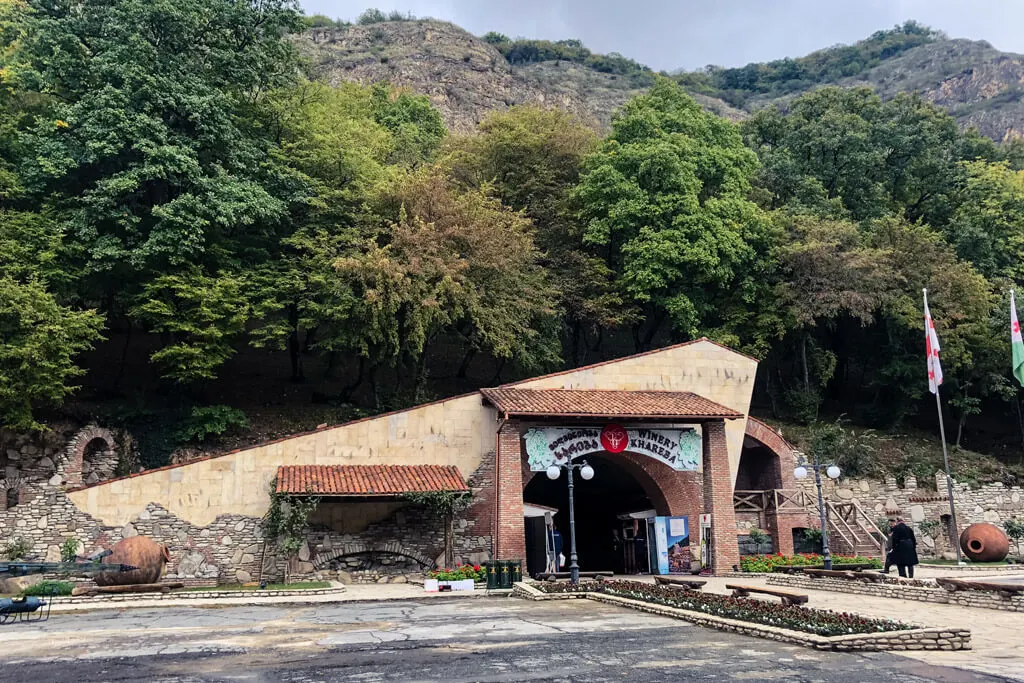
Entrance to the (cave of) Khareba Winery in Georgia
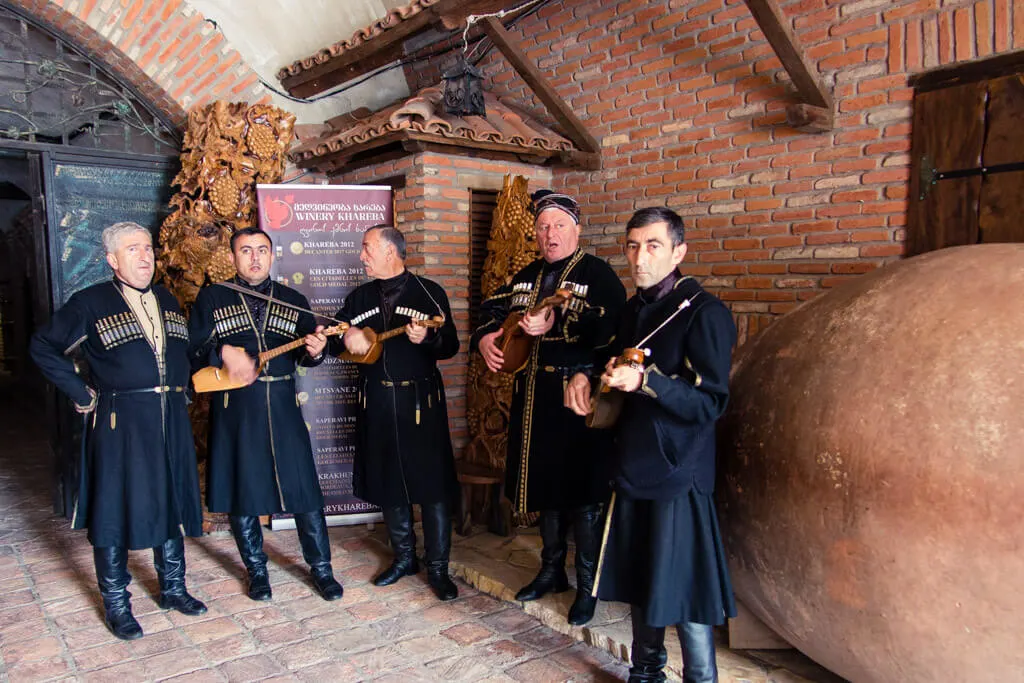
A musical welcome to Khareba Winery :)
Khareba was founded in 1955 and came into private hands in 2016. The winery proudly boasts the title “the largest wine cellar in Georgia”. Also their qvevri is the biggest – it can hold 3,000 litres!
However, it’s mostly wines made using the European technology that keep Khareba well stocked with awards – it has earned 52 gold medals already.
Using only grapes from their own vineyards, Khareba also makes sparkling wine and they were the first in Georgia to produce grape seed oil.
There are a few different tour options for you to choose from, including a tasting. Each tour features a part of the tunnels and some even go to the winery’s tower and restaurant.
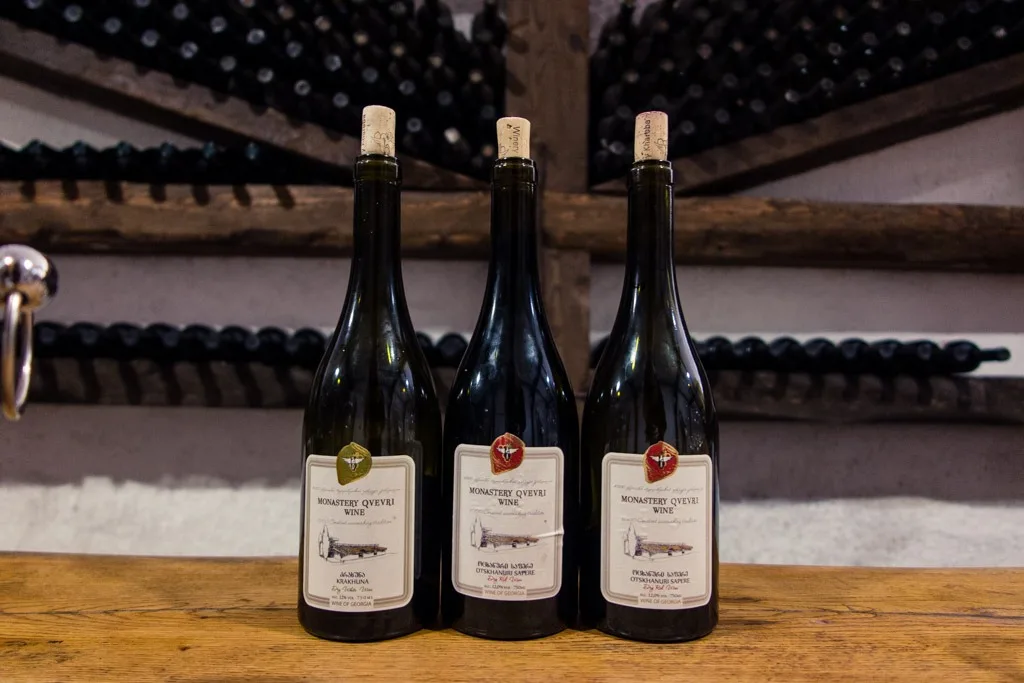
Wines for degustation at Khareba Winery
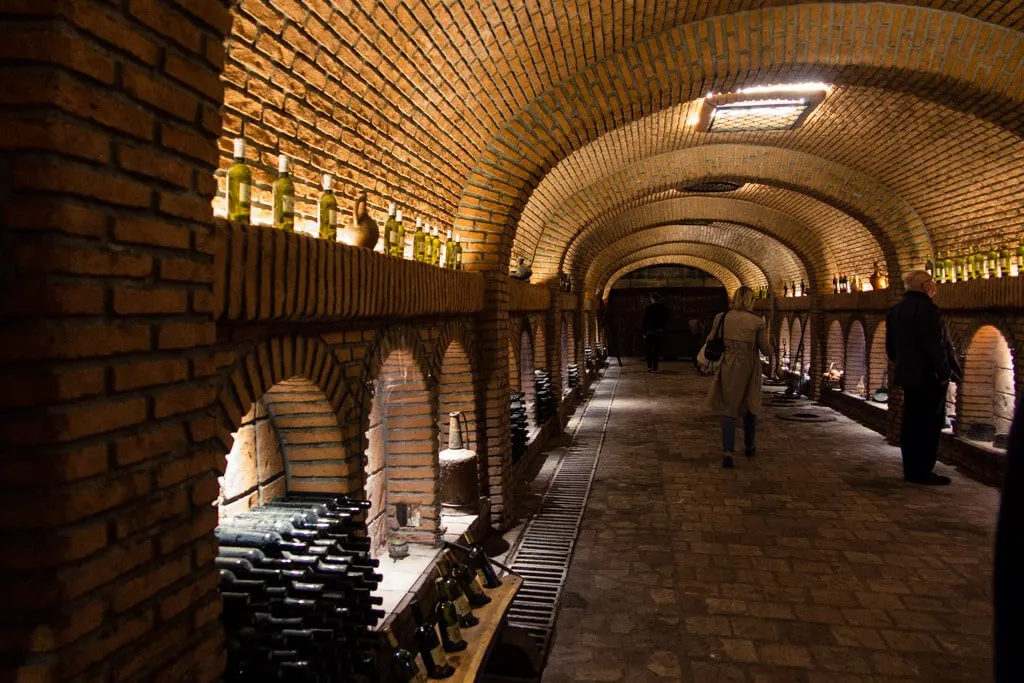
Cellar part of Khareba tunnels
Map
Find all the Georgia wine places mentioned in this article on the map below:
Getting Around Georgia
I can highly recommend the tours we took via JayWay, but you can also get to all of these places by hiring a local driver, getting a taxi, or figuring out the public transport.
The last option is not easy. Georgia’s public transport runs on marshrutkas, small minivans inherited from Russia. Your hotel or guesthouse should help you navigate those.
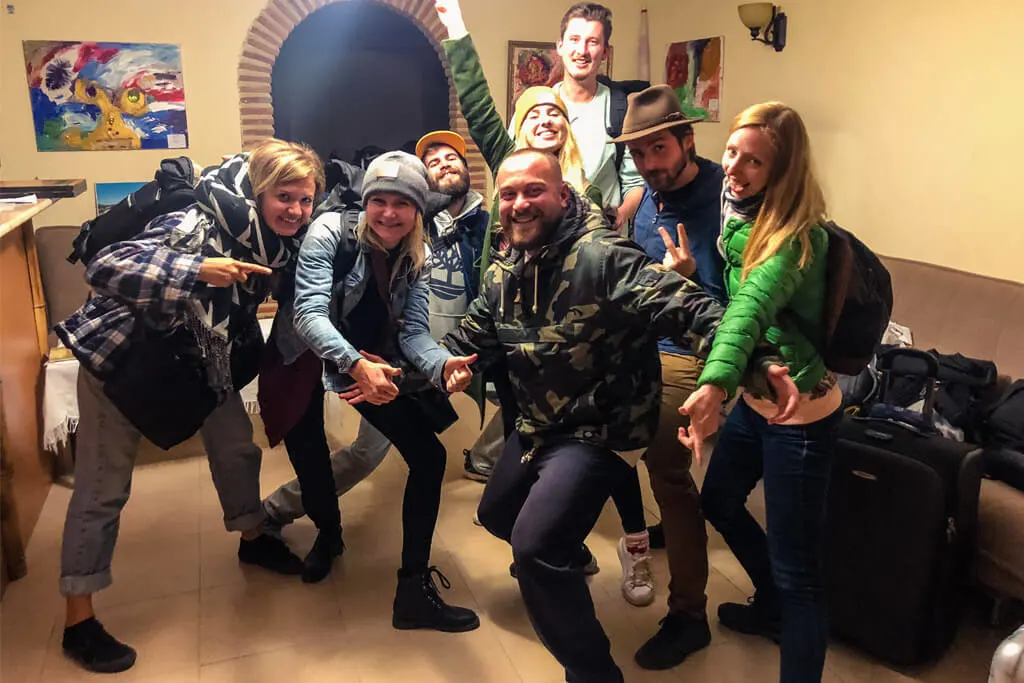
Our fun crew in Georgia, with our guide Gerorge in the middle.
When you visit Georgia, make sure to taste their amazing wine every single day, even if you’re not a wine connoisseur.
What are your thoughts on Georgia and Georgian wine? Let me know in the comments! :)
Disclosure: Veronika of TravelGeekery visited Georgia on a sponsored trip organized by the boutique tour company JayWay Travel. The opinions presented here are, as always, her own and unbiased.

Caucasus Blogger Trips Roundup
Monday 27th of January 2020
[…] Discovering Georgian Wine in and Near Tbilisi […]
Rachel
Saturday 13th of July 2019
Wow, I consider myself a big wine fan but I had no idea that Georgia was so well known for, or had such a long history of wine-making! I was considering a trip to Tbilisi and now I think I will definitely be going. Thanks for putting this on my radar!
Do we get Vegetarian food in Georgia? – A glimpse of Georgian cuisine – Travel With Me 24 X 7
Friday 5th of July 2019
[…] dumplings are usually eaten as a main course, and you should of course always drink Georgian wine […]